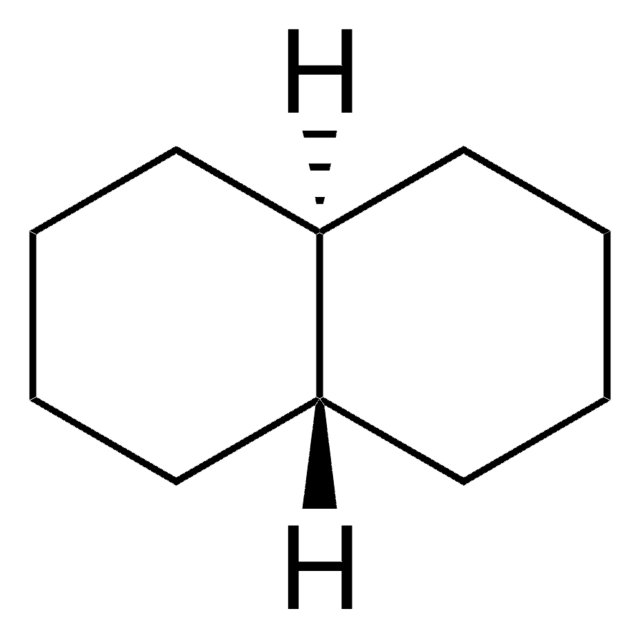8.03101
Decahydronaphthalene
(mixture of cis-and trans isomers) for synthesis
Synonym(s):
Decahydronaphthalene, Decalin
About This Item
Recommended Products
vapor pressure
1.3 hPa ( 20 °C)
Quality Level
assay
≥99% (GC)
form
liquid
autoignition temp.
255 °C
potency
4170 mg/kg LD50, oral (Rat)
5192 mg/kg LD50, skin (Rabbit)
expl. lim.
0.7-4.9 % (v/v)
kinematic viscosity
<20.5 cSt(25 °C)
bp
189-191 °C/1013 hPa
mp
-40 °C
transition temp
flash point 57 °C
solubility
0.006 g/L (experimental)
density
0.88 g/cm3 at 20 °C
storage temp.
2-30°C
SMILES string
C21C(CCCC2)CCCC1
InChI
1S/C10H18/c1-2-6-10-8-4-3-7-9(10)5-1/h9-10H,1-8H2
InChI key
NNBZCPXTIHJBJL-UHFFFAOYSA-N
Related Categories
Application
- Aerobic biotransformation of decalin (decahydronaphthalene) by Rhodococcus spp.: This study examines the aerobic biodegradation capabilities of Rhodococcus strains with decalin, highlighting potential applications in bioremediation and industrial bioprocesses (Gray et al., 2008).
- Discovery and identification of a series of alkyl decalin isomers in petroleum geological samples.: This research utilizes advanced chromatographic techniques to identify and characterize alkyl decalin isomers in petroleum samples, offering insights into petroleum geochemistry and reservoir characterization (Liu et al., 2015).
- Ultrasound-induced cracking and pyrolysis of some aromatic and naphthenic hydrocarbons.: Explores the effects of ultrasound on the cracking and pyrolysis of hydrocarbons including decahydronaphthalene, offering potential enhancements in chemical processing and analytical methodologies (Cataldo, 2000).
Analysis Note
Density (d 20 °C/ 4 °C): 0.879 - 0.883
Identity (IR): passes test
signalword
Danger
Hazard Classifications
Acute Tox. 3 Inhalation - Aquatic Acute 1 - Aquatic Chronic 1 - Asp. Tox. 1 - Flam. Liq. 3 - Skin Corr. 1B
Storage Class
3 - Flammable liquids
wgk_germany
WGK 3
flash_point_f
134.6 °F - closed cup
flash_point_c
57 °C - closed cup
Certificates of Analysis (COA)
Search for Certificates of Analysis (COA) by entering the products Lot/Batch Number. Lot and Batch Numbers can be found on a product’s label following the words ‘Lot’ or ‘Batch’.
Already Own This Product?
Find documentation for the products that you have recently purchased in the Document Library.
Our team of scientists has experience in all areas of research including Life Science, Material Science, Chemical Synthesis, Chromatography, Analytical and many others.
Contact Technical Service










